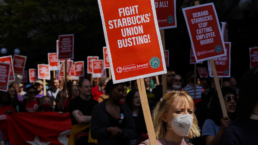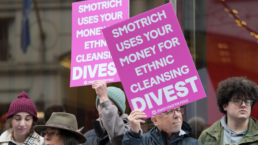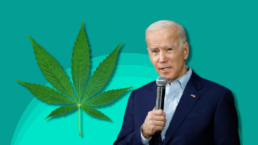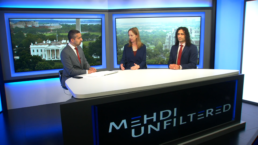In their continuing struggle with a $133 billion company, the Starbucks unionized workers and organizers are engaged in fulfilling a basic task of any effective union, i.e. representing the economic and political interests of working-class Americans.
By Andrew Moss, CounterPunch
For good reason, the fight to unionize Starbucks has drawn considerable public attention since workers at a Buffalo, New York store voted to unionize in December of 2021. Since that time, workers at more than 300 stores, representing more than 8000 workers, have so voted. The campaign has been met with strong company resistance, resulting in legal rulings that found Starbucks violating federal labor law by (among other things) illegally surveilling workers, firing workers involved in union organizing, and adding workers at specific workplaces to dilute union strength. In an eventful year-and-a-half, the company has failed to negotiate a single contract.

This union fight, like those at other large corporations, has exposed the public to current practices of “union busting,” and such exposure carries an additional charge in the case of Starbucks because of the personal connections many people have to their local stores and to the workers who prepare and serve their coffee.
But there’s another dimension to the fight that, for many, is less readily apparent, and this has to do with the struggle’s implications for American democracy. As political scientist Danielle Allen put it, a democratic society means “equality entailed in sharing ownership of public life and in co-creating our common world.” That shared ownership and co-creation extends to the workplace as much as it does to other aspects of our everyday lives.
The issue came into sharp relief at a March hearing of the Senate Health, Education, Labor & Pensions committee, a hearing that served as grand political theater for an airing of ideas and attitudes about the Starbucks campaign and about labor relations in general. The committee chair, Senator Bernie Sanders (I-Vermont) focused his introductory remarks and his questioning of former Starbucks CEO Howard Schultz to represent the company’s resistance to the union as sustained, pernicious, and illegal.
Recent Posts
Carrying On Kent State’s Legacy Of Antiwar Organizing, Students Press For Divestment
May 19, 2024
Take Action Now Students at Kent State won disclosure of the university’s investment portfolio, but the fight to divest from the war industry is…
Biden Administration Moves To Reclassify Marijuana: A Major Shift In U.S. Drug Policy
May 17, 2024
Take Action Now President Biden’s Department of Justice takes historic steps to reclassify marijuana, aiming to end a ‘failed approach’ and…
‘Worse Than Iraq’: Three Former Biden Officials Explain Why They Resigned Over War In Gaza
May 16, 2024
Take Action Now “There’s just this blind unwillingness to recognize the U.S. does have all the power here – this notion that it’s not really…
Reflections On Student Activism
May 16, 2024
Take Action Now William Hartung, Democracy Versus Autocracy on America’s Campuses By William D. Hartung, Tom Dispatch I’ve spent most of my…




